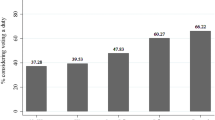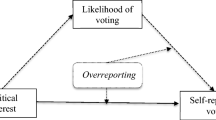Abstract
Of those eligible, about 40% do not vote in presidential elections. When asked, about a quarter of those nonvoters will lie to the survey takers and claim that they did. Increases in education are associated with higher voting rates and lower rates of lying overall, but with increased rates of lying conditional on not voting. This paper proposes a model of voter turnout in which people who claim to vote get praise from other citizens. Those who lie must bear the cost of lying. The model has a stable equilibrium with positive rates of voting, honest non-voting, and lying. Reasonable parameter changes produce changes in these proportions in the same direction as the changes actually observed across education levels. I argue that a model where people vote because they want to be known as voters provides a better explanation for observed voting behavior than does a model where people vote because they want to vote.
Similar content being viewed by others
References
Abramson, P.R., Aldrich, J.H., and Rohde, D.W. (1983). Changes and continuity in the 1980 elections, rev. ed. Washington DC: Congressional Quarterly Press.
Aldrich, J.H. (1993). Rational choice and turnout. American Journal of Political Science 37: 246–278.
Ashenfelter, O., and Kelley Jr., S. (1975). Determinants of participation in presidential elections. The Journal of Law and Economics 18: 695–733.
Ferejohn, J.A., and Fiorina, M.P. (1974). The paradox of not voting: A decision theoretic analysis. American Political Science Review 68: 525–36.
Frank, R.H. (1988). Passions within reason. New York: Norton.
Miller, W.E., and the National Election Studies. (1988). American national election study: Pre and post election survey. Conducted by the Center for Political Studies of the Institute for Social Research, The University of Michigan. 2nd ICPSR ed. Ann Arbor, MI: Inter-University Consortium for Political and Social Research, 1989.
Mueller, D.C. (1989). Public Choice II. Cambridge: Cambridge University Press.
Presser, S., and Traugott, M. (1992). Little white lies and social science models. Public Opinion Quarterly 56: 77–86.
Riker, W.H. and Ordeshook, P.C. (1968). A theory of the calculus of voting. American Political Science Review 62: 25–42.
Silver, B.D., Abramson, P.A., and Anderson, B.A. (1986). The presence of others and overreporting of voting in American national elections. Public Opinion Quarterly 50: 228–239.
Silver, B.D., Anderson, B.A., and Abramson, P.A. (1986). Who overreports voting? American Political Science Review 80: 613–24.
Spence, A.M. (1974). Market signalling. Cambridge: Harvard University Press.
Author information
Authors and Affiliations
Additional information
I thank Jay Coggins, Rick Harbaugh, Ron Johnson, Kate Krause and Doug Young for their help with this paper.
Rights and permissions
About this article
Cite this article
Harbaugh, W.T. If people vote because they like to, then why do so many of them lie?. Public Choice 89, 63–76 (1996). https://doi.org/10.1007/BF00114279
Accepted:
Issue Date:
DOI: https://doi.org/10.1007/BF00114279




